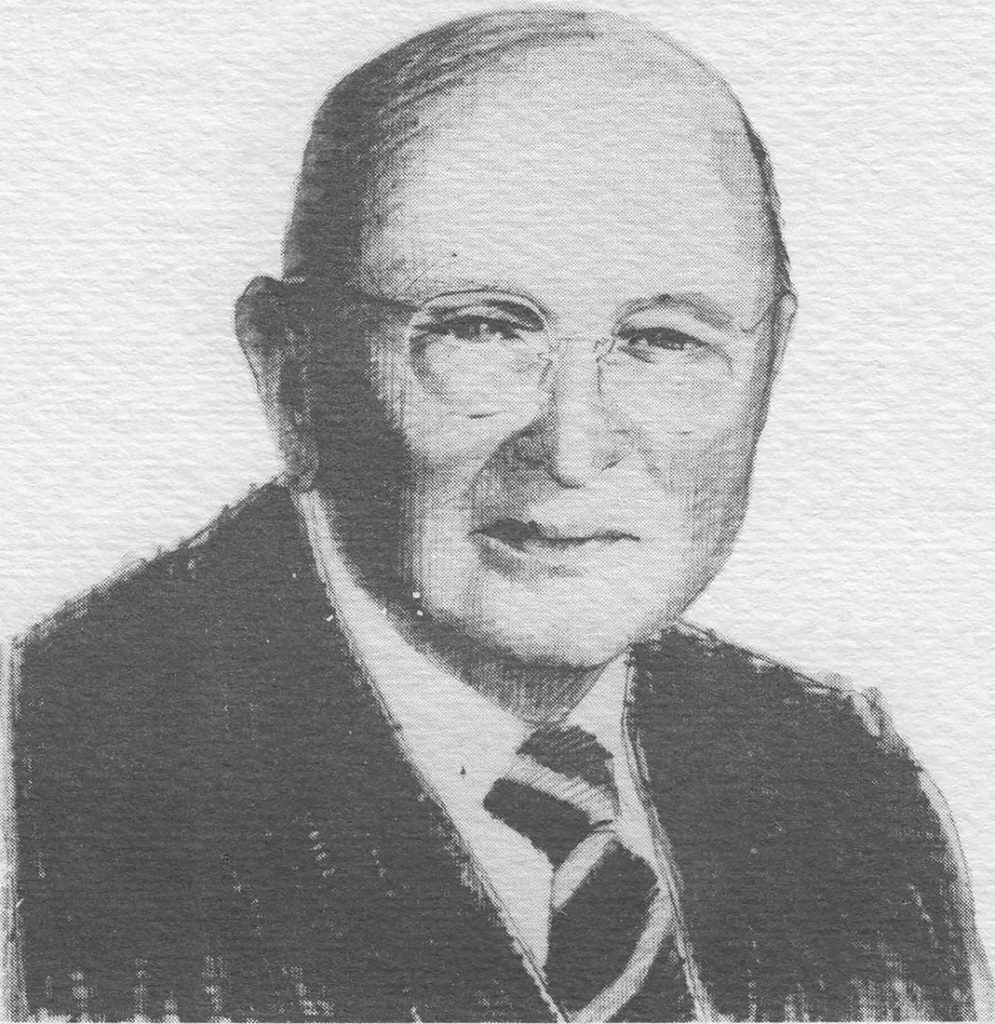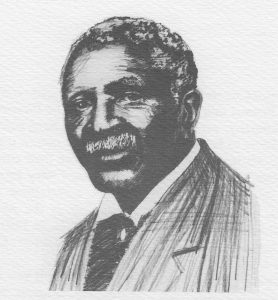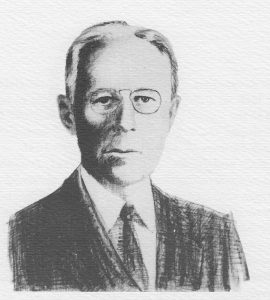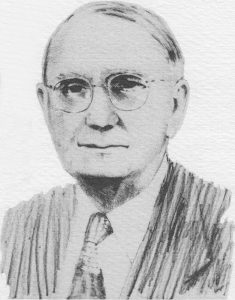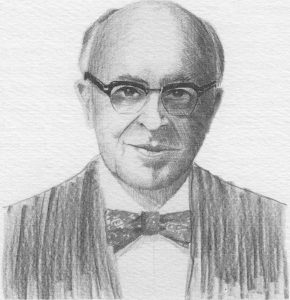The Rushton name is synonymous with Birmingham and the name William James Rushton is synonymous with Protective Life Company, which he guided and developed into a major financial institution.
William Rushton, one of the two living inductees into the Alabama Business Hall of Fame this year (1980), is the second Rushton to be inducted – his father, the late James Franklin Rushton, was inducted in 1975.
William “Bill” Rushton was born in Birmingham, Alabama, on July 10, 1900. The son of James Franklin Rushton and Willis Roberts Rushton, he was one of eight children. His father, a pioneer in the ice industry, was President of the Birmingham Ice and Cold Storage Company and the owner of other ice plants in Alabama and neighboring states.
Bill Rushton grew up in Birmingham and attended McCallie School in Chattanooga, Tennessee, where he graduated in 1917. Upon graduation, he enlisted as a private in the U.S. Army and served in the infantry during World War I. Shortly after the Armistice in November 1918, Rushton was honorably discharged with the rank of sergeant. He soon continued his education, enrolling at Washington and Lee in Lexington, Virginia, where he made his reputation as a scholar and an outstanding debater. He graduated in 1921 with a Bachelor of Science degree.
Upon graduation, Rushton returned to Birmingham where he joined the Birmingham Ice and Cold Storage Company as assistant manager, a position he held for five years. In 1927 he was promoted to Vice President, and in 1932 he was named President. By 1937 Rushton had also served as president of the three national trade associations of his company’s business the ice, cold storage, and warehouse business.
In 1927 Rushton began a long association with the Protective Life Insurance Company as a member of its Board of Directors. Protective Life had been organized in 1907 by former Governor William D. Jelks, who guided the company through its first two decades. During these first decades, Jelks gave Protective Life a sense of quality. During Rushton’s tenure, growth would be the hallmark of administration.
One of the first important changes made during his presidency was the addition of the “group creditor” line of insurance in 1939. Group creditor insurance is issued to cover small loans made by banks and other financial institutions to their customers. Later, the Company entered the pension trust and group annuity field. Under Rushton’s leadership, Protective Life became a major factor in Group Life and Group Health fields.
When Rushton became President of Protective Life and Chief Executive Officer in 1937, the United States faced financial difficulties with the Stock Market decline and its slow recovery. Soon the country faced mobilization and World War II. Protective Life weathered these financial difficulties successfully, but World War II interrupted Bill Rushton’s career with his company.
In 1926 Rushton was commissioned a second lieutenant in the U.S. Army reserves. In September 1940, Rushton, who now held the rank of major, was called to serve on the staff of Major General Lewis B. Hershey to administer the draft. In March 1942, Rushton was promoted to Lieutenant Colonel and assigned to the Birmingham Ordnance Office where he held several different positions. In the following year, he was promoted to the deputy district chief in charge of ordnance procurement in five southern states. In January 1944, Rushton was promoted to Colonel, a title by which he is still affectionately and respectfully known. In September 1944, at his own request, he returned to inactive status but later held the post of Civilian District Chief of Ordnance. Because of his service to the Army, he received numerous citations, including the Legion of Merit.
On his return to civilian life in 1944 Rushton once more took the helm of Protective Life and during the next two decades continued the pattern of success he had shown earlier. In 1947, when Protective Life celebrated its fiftieth anniversary, it had reached a significant stage in its history. Of the nearly twelve hundred insurance companies in the nation with insurance in force, Protective Life ranked sixty-fifth. Of the total of more than four hundred companies with group life in force, it ranked twenty-sixth. Much of this growth is attributable to the leadership of Rushton.
By the early sixties, Rushton was recognized as a national leader in the field of insurance. As a result of the respect of his fellow insurance executives, the Colonel was named director to a number of insurance associations including the Life Insurance Association of America, the Health Insurance Association of America, and the Institute of Life Insurance.
In 1967, after three decades as President of Protective Life, Rushton stepped down as President but was named Chairman of the Board, retaining the title of Chief Executive Officer. In 1969 he retired from Protective Life. In that year Protective Life had more than $2 billion of life insurance in force and more than $170 million in assets, a testimony to Colonel Rushton’s leadership.
Rushton’s business acumen resulted in other corporations seeking him as a director. In 1927 he was named a director of the First National Bank of Birmingham, the youngest director in the history of the bank. In addition, he has served on the board of directors of the Alabama Bancorporation; Alabama Power Company; Gulf, Mobile and Ohio Railroad; Illinois Central Gulf Railroad; and the Moore-Handley Hardware Company.
Throughout his long career, Rushton was supported by his loving and devoted wife Elizabeth Jane Perry, whom he married on November 24, 1926. The Rushton’s became the parents of two children, James Rushton and William James Rushton, III.
Colonel Rushton has had a lifelong commitment to worthwhile civic, cultural, charitable, and religious causes. A strong believer in youth, Rushton has been a supporter of the Boy Scouts. Not only did he serve as Scoutmaster but also as a director and president of the Birmingham Boy Scout Council. In religious endeavors, he has worked with the First Presbyterian Church, of which he has been a lifelong member. He has served as a deacon, and as Chairman of the Board of Trustees, as well as a member of the Board of Annuities and Relief for the Presbyterian Church of the United States. In the health field, he has served as a trustee of the Children’s Hospital and the Southern Research Institute.
Much of Rushton’s civic work has been with the Birmingham Community Chest. In 1937 he became a director of the Community Chest, in 1945 was named to the Executive Committee, and in 1954 was elected President. A few years later he was designated as one of only nine “Honorary Life Members” in the history of Birmingham’s Community Chest. He has also served as a member of the National Citizens Committee of the United Community Chest Campaigns of America.
Because of his strong commitment to community and service, the Colonel has received many awards and honors. Among those is induction into the Alabama Academy of Honor. Educational institutions have also honored him. In 1959 Rushton received an honorary Doctor of Humanities degree from Southwestern University at Memphis and in 1980 an honorary Doctor of Laws from the University of Alabama in Birmingham. For his support of scouting, he received the Silver Beaver Award from the Boy Scouts of America. In 1976 Dixie Magazine named him “Man of the South” and on November 24, 1976, David Vann, the Mayor of Birmingham, proclaimed that day as “Colonel William J. Rushton Day.”
William James Rushton has had two separate careers – businessman and soldier – in both he has demonstrated leadership and excellence. No less than the late Thomas W. Martin said of Rushton, “There is nothing he touched he did not adorn.” Fortunately, Bill Rushton continues to touch and enrich the lives of many people.

